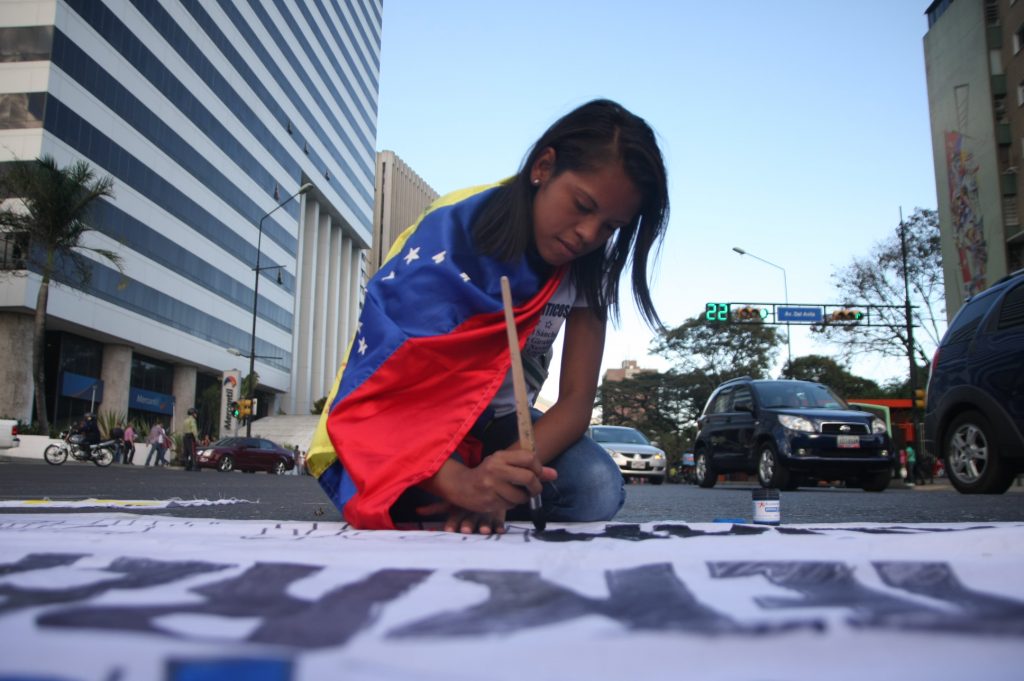With one stroke, the Supreme Court effectively suppressed the right to spontaneous protest in Venezuela. The Constitutional Court, in a decision presented by Justice Arcadio Delgado decided on 24 April 2014 that Venezuelans must apply for permission to demonstrate; otherwise they face risk of being repressed by the security agencies.
“Political parties and/or organizations and all citizens–when they decide to hold public meetings or demonstrations—must comply with the administrative procedure of requesting authorisation before the first civil authority of the relevant jurisdiction, in order to exercise fully their constitutional right to peaceful demonstration,” explained the highest court of the country.
Failure to comply with this requirement, the Supreme Court warns, “may lead to the police and security forces in the control of public order to ensure the right to free movement and other constitutional rights (such as the right to access to a healthcare centre, the right to life and physical integrity), by dispersing these concentrations using the most appropriate means, under the provisions of the Constitution and the legal code.”
The judges added that the authorisation may be denied or modified “in terms of the location and the itinerary chosen.” They also state that if a person rebels against this provision, the Public Prosecutor must intervene “for the purpose of determining criminal responsibility for the crime of disobedience to authority under Article 483 of the Penal Code, and criminal and legal liability that may have arise due to unlawful conduct shown during or in connection with these demonstrations or public meetings.”
Although municipal police do not have riot gear but guns to enforce the law, the Constitutional Court also noted that these police departments “have an obligation to support the rest of the security forces (state police, National Police and Bolivarian National Guard) in controlling public order as it may be altered during the illegal exercise of the right to protest.”
To understand this ruling, we must take into account the context in which it was issued. In principle, the Supreme Court addressed this issue to answer a request for interpretation of Article 68 of the Constitution filed by the mayor of Guacara (Carabobo), Gerardo Sánchez Chacón. The petition was filed by Chacón, leader of the ruling United Socialist Party of Venezuela, on March 25, 2014 and was resolved within a month.
By the time the judges issued their decision, the government of President Nicolás Maduro was facing a wave of protests in several states, which resulted in over 40 people dead and hundreds of injured and arrested.
Justice Delgado cited as reference the Law on Political Parties, Public Meetings and Demonstrations, in force since December 23, 2010. This text is part of the controversial set of laws approved by chavista deputies at the National Assembly after the parliamentary elections of 26 September that year, after learning that in the coming term they would not have a majority in the House.
The Court’s decision leads to bizarre situations such as a group of citizens waiting for a mayor to grant them permission to protest against him. In short, the judges gave a blow to peaceful protest in Venezuela.
Extract of the judgment
The authorisation issued by the first civil authority of the jurisdiction (…) is a legal requirement, a breach of which limits the right to peaceful demonstration, (…) any assembly, demonstration or public meeting not having the prior authorisation (…) may lead to the police (…) to disperse these concentrations using the most appropriate means (…) the first civil authority of the jurisdiction (…) [can] not only deny the authorisation, but also modify it in case it is approved, in terms of location and itinerary chosen (…) in case of disobedience of the decision taken by [the Mayor ] (…) [the latter] (…) shall forward to the Public Prosecutor,(…) the information pertaining to individuals who requested authorisation for peaceful demonstration, for the purposes of determining their criminal liability for the crime of disobedience to authority (…)
